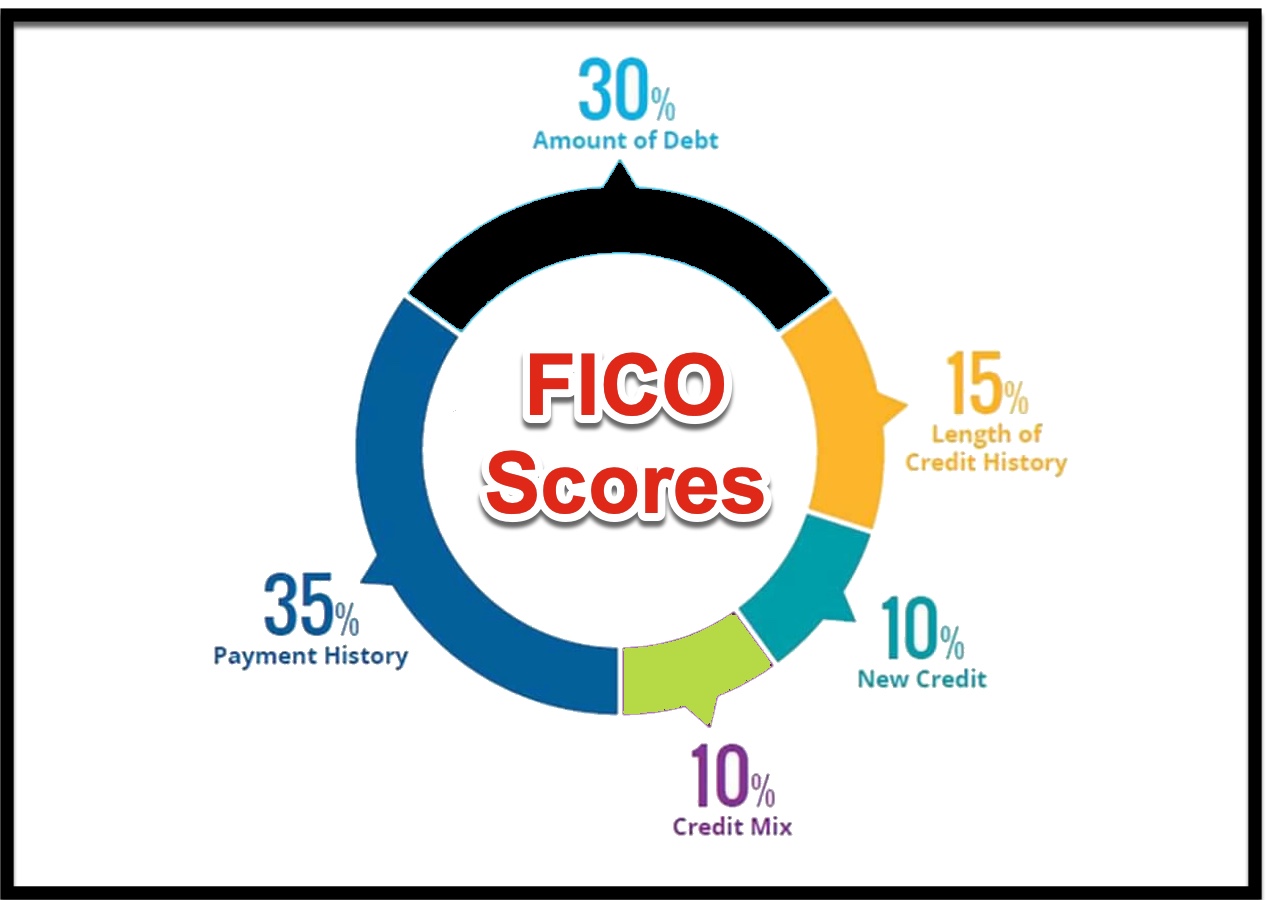How Bad Credit Affects Your Credit Score
What Is Your FICO Score
One of the first known credit scoring services was known as FICO, originally Fair, Isaac, and Company. The company was founded in 1956 by Bill Fair and Earl Isaac as a data analytics company based in San Jose, California. Its FICO score gave a measure of consumer credit risk and became the fixture of what lenders use to analyze consumer risk factors.
FICO scores range from 300 to 850, and a score of 670 and above is considered to be a good credit score, while a credit score of 800 and above is considered to outstanding. Now in the 21st century, things have most certainly changed. A low FICO score will make it difficult for you to get anything on credit with a decent interest rate. Unless you are willing to pay upwards to 30% in some cases, a low FICO score is not only bad for you but will cost you more than 3 times what the average person with good credit will pay for the same purchase.
Who Keeps The Credit Scores
There are 3 major companies that keep what is known as your credit files. The 3 major companies or credit bureaus are Equifax, Experian, and Transunion. Each one of these companies asks for every line of credit extended to you be reported to them, along with how you make your monthly payments, the accounts you have open with different companies, and who requests to view your credit history. They also want to know of any public records against you such judgments, bankruptcies, or closed accounts with their payment history as well.
There are other companies that keep up with your public information, but they are not used to keep a credit score. The most notable of these is called LexisNexis. These companies are more used when you are searching for insurance quotes or certain types of credit cards that have a no credit check.
These reports usually show all the items on your credit report, along with other personal information, most notably, your insurance information. They will show when you had claims, when your insurance started, ended, the reasons for service ending. Did you lose insurance due to non-payment? This is how other insurance companies always no. LexisNexis always keeps up with every address, phone number, email address, and just about everything else you would consider to be personal information.
Scores That People Receive From Their Credit Reports
Each of the 3 major bureaus issues a score between 350 and 850. A credit score over 720 is considered to be a good credit score and above 750 is considered to be in the great credit range. Below a 650 score is now considered to be sub-par credit. Having a score below 580 makes it very difficult to purchase anything using a line of credit.
It is important to understand what factors play into the generation of your credit score. While there is no specific order as to how they score, these are the major factors that are considered when your score is generated:
- Credit age or how old your oldest piece of credit is. Companies like to see if you can keep an account open for a long period of time. While paying on time each month. The longer you have credit open, the more your score will start to rise. Typically, getting credit over 5 years old is considered to be good, and getting up to the 10-year-old range with no late payment is considered, great.
What Are The Three Major Types Of Credit
Credit scores are utilized by credit card companies, banks, car dealerships, mortgage companies, and a host of other financial institutions in the business of loaning money and issuing credit. The most common types of credit accounts are revolving credit, which are credit cards or store cards. The other is an installment account, one in which you make payments to the overall price of the item. Most notably these are for motor vehicle purchases. Lastly, real estate accounts which cover home loans. Although there are other types of credit these are the major types. Bureaus like to see that you have accounts of all types when issuing high credit scores.
How Your Credit Utilization Stacks Up
So how you use these credit accounts is the next major factor in determining your scores. This is called credit utilization. It’s simply how high you keep debt. Credit companies like to see you use less than 35% of your available credit. The higher the balance you keep per account, the lower your score will be.
The Importance Of Payment History
Payment history is very important when it comes to the last factor as well. If you have a diverse group of credit and accounts that are old, and you have not paid them on time, your score will suffer. Credit payments are listed as either on time, 30, 60, 90, or 120 days late. If you fail to make your monthly payments, your creditor will list the as a charged off. Each one of these negative marks will drastically bring down a credit score. Charge off means, that company has actually stopped collection attempts, closed your accounts, and sent it to legal (which is a department when lawyers are involved) to come after their money. A lot of times, these debts are actually sold and issued to a new debtor who can actually report it again as bad debt and hurt your credit score again.
The Cost Of Bad Credit
Yes, there is a price to pay for having bad credit. Missed payments, late payments, and failure to pay have its consequences, unfortunately, they are negative when it comes to your credit scores. It already limits your ability to get things on credit and when you do get accepted credit, it’s at an extremely high-interest rate. Take a look at the numbers and see where you would fit in with your credit scores and how the point system works on your credit.
- Exceptional Score 800 – 850
- Very Good 740 – 799
- Good 670 – 739
- Fair 580 – 669
- Very Bad 579 – 300
- Hard Inquiry – decrease up to 15 points lost
- Late Payment – decrease up to 100 points lost
- Collection – decrease up to 110 points lost
- Debt Settlement – decrease up to 125 points lost
- Foreclosure – decrease up to 160 points lost
- Bankruptcy – decrease up to 240 points lost
Inquiries
Finally letting companies see your credit can impact your scores and bring it down as well. This is called an inquiry. When you are trying to make a purchase or get qualified for credit cards, your scores are impacted each time one of these companies requests a copy of your report from the bureaus. Having under 3 inquiries on your credit profile at any time is ideal.
What Type Of Effect Does Credit Have On Your Daily Life
So we know how our scores or calculated but how do they have an effect on your daily life? Well, they have a huge effect on daily life and it’s all about how having bad credit can cost you. First of all, bad credit is embarrassing and it affects your dignity. If you are going to a department store and are asked to sign up for one of their credit cards for a discount but when you have bad credit, you know you can’t sign up because you will be declined on the spot because you know you have bad credit. If you have bad credit and you need a loan for any purpose, click here for Trusted lenders ready to serve you.
Even when you are shopping for a car, not only will bad credit affect the type of car you can purchase, it will also affect how much money the vehicle will ultimately cost you. Car dealers may offer no money down deals and 0% financing on certain cars but no for bad credit customers. When car shopping with bad credit, most lenders will want you to put a large percentage down, along with interest rates in the upper 20% range. This is considered to be risk-taking for the car dealership but can be life-changing problems for the consumer. When receiving a single digit interest rate, an average $30,000 dollar car payments can be well under $700 dollars but if you have to pay a high-interest rate and are only offered a short term, your payment can be closer to $1,000 per month and drastically change your monthly budget. You usually end up looking for a less expensive car.


